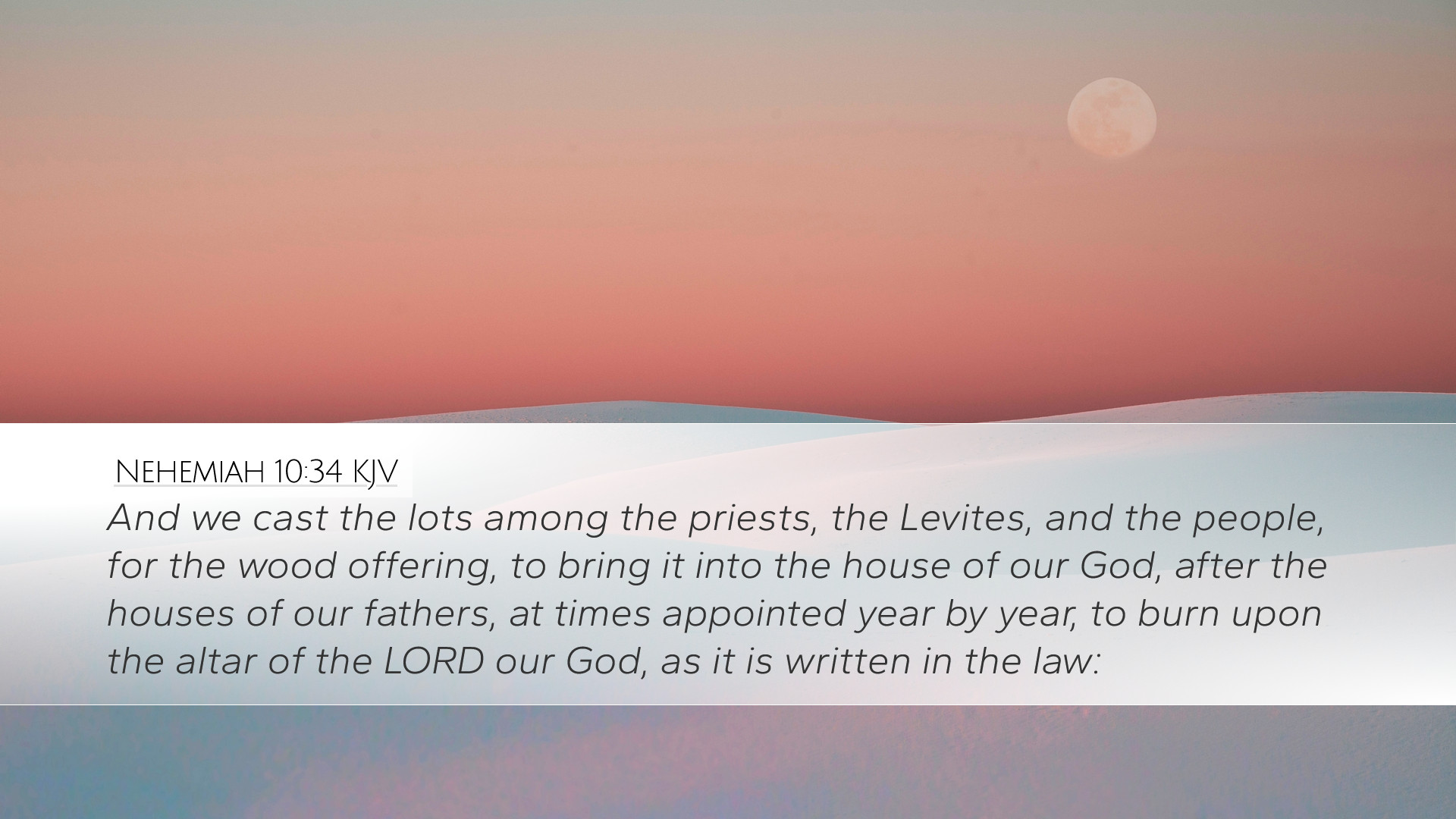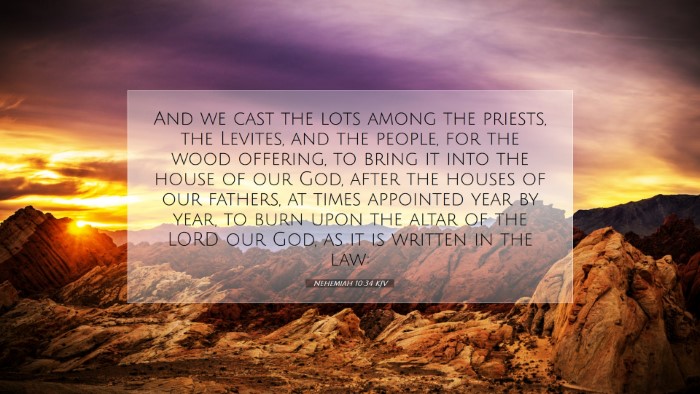Commentary on Nehemiah 10:34
Nehemiah 10:34 reads: "And we cast the lots among the priests, the Levites, and the people, for the wood offering, to bring it into the house of our God, after the houses of our fathers, at times appointed year by year, to burn upon the altar of the LORD our God, as it is written in the law."
Introduction
The verse under consideration is part of the covenant renewal and restoration movement as seen in the book of Nehemiah. It highlights the systematic approach the Israelites took in fulfilling their commitments to God, particularly regarding the wood offerings. This was a significant aspect of their worship, emphasizing obedience to the law and community involvement.
Historical Context
After returning from Babylonian exile, the people of Israel were keen on restoring their national identity and religious practices. Nehemiah, as a leader, played a crucial role in the rebuilding of the wall of Jerusalem and in the spiritual restoration of the people. Nehemiah 10 outlines the commitments that the people made to obey God's law, including provisions for worship.
Exegesis and Analysis
-
Significance of Casting Lots:
Matthew Henry comments that casting lots was a biblical method of seeking divine guidance. In this context, it reflects a desire for God to lead the community in their offerings, ensuring that the responsibility of bringing wood for the altar was evenly distributed among the Levites and the people. This method not only promotes fairness but also acknowledges God's sovereignty over the distribution of duties within the community.
-
Wood Offering Coverage:
Albert Barnes notes that the wood offering was essential for the daily sacrifices prescribed in the Law. The act of bringing wood for the sacrifices indicated diligence in spiritual duty and a collective commitment of the people to maintain proper worship settings. It reflects a responsibility that the community took on collectively, emphasizing the importance of shared service in worship.
-
Times Appointed:
Adam Clarke elaborates on the phrase “at times appointed year by year.” This refers to the regular observance of bringing offerings according to established times. It shows an organized approach to worship and adherence to ritual, which was indispensable for fostering a culture of worship among the Israelites. The recurrent nature of this practice ensured that the altar of the Lord was consistently maintained and honored.
-
Implications for Worship:
As noted by various commentators, the determination to bring wood to the altar signifies not only a logistical arrangement but a heart of worship and reverence for God. This demonstrates that worship requires more than mere participation; it demands dedication and intentional planning within the community of believers.
-
Reflection of the Law:
This verse points back to the Torah, highlighting the necessity of obedience to the written Law. Matthew Henry emphasizes that adherence to God’s commandments is a priority for the faithful. The Israelites’ commitment as recorded in Nehemiah 10 serves as an indication of their recognition of God’s authority and their willingness to align their lives with His statutes.
Theological Reflections
-
Community and Responsibility:
The verse encourages collective responsibility among believers. The casting of lots signifies democratic participation, showing that worship involves the entire community, not just a select few. This theme recurs in Christian practice where the body of Christ is called to serve together in various forms of ministry.
-
Preparation for Worship:
This passage teaches about the need for preparation in worship. Just as the Israelites prepared their offerings, modern believers are encouraged to prepare their hearts and lives to meet with God. This involves understanding Scripture, engaging in communal accountability, and establishing a regular rhythm of worship.
-
Divine Provisions:
The assurance that God provides what is necessary for worship is a vital takeaway. Just as God provided for the needs of the Israelites in the wilderness, He continues to provide for His people today. This reflection inspires trust and reliance on God's faithfulness in all aspects of ministry.
Conclusion
Nehemiah 10:34 is a profound reminder of the collective duty of God's people to engage actively in worship through organized and God-honoring practices. The insights drawn from this verse inspire pastors, students, and theologians to consider the significance of communal worship, adherence to divine commandments, and the importance of preparation in leading a life that pleases God. As modern believers reflect on these principles, they can cultivate a deeper and more meaningful worship experience rooted in both individual commitment and community involvement.


